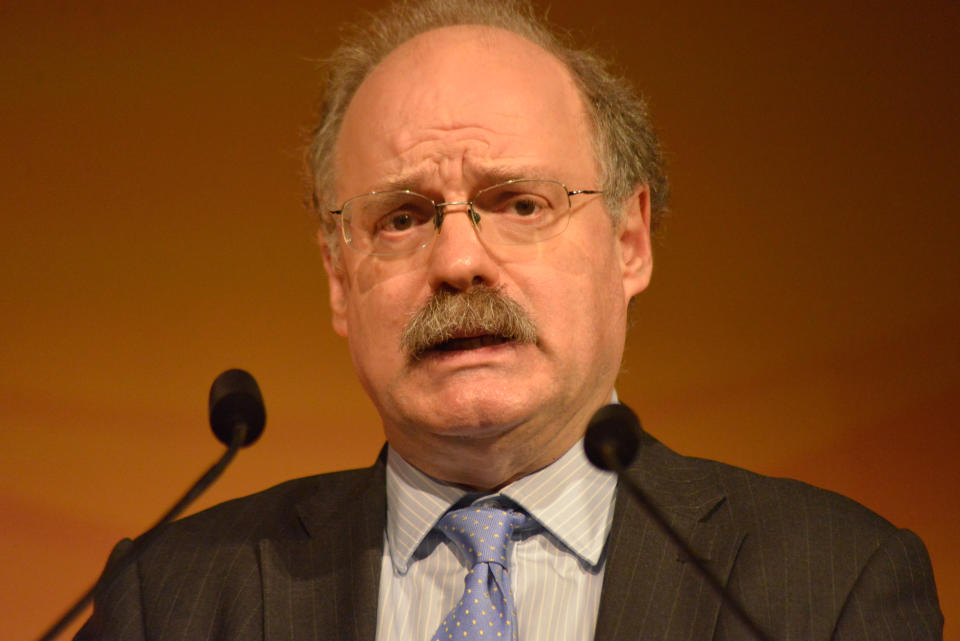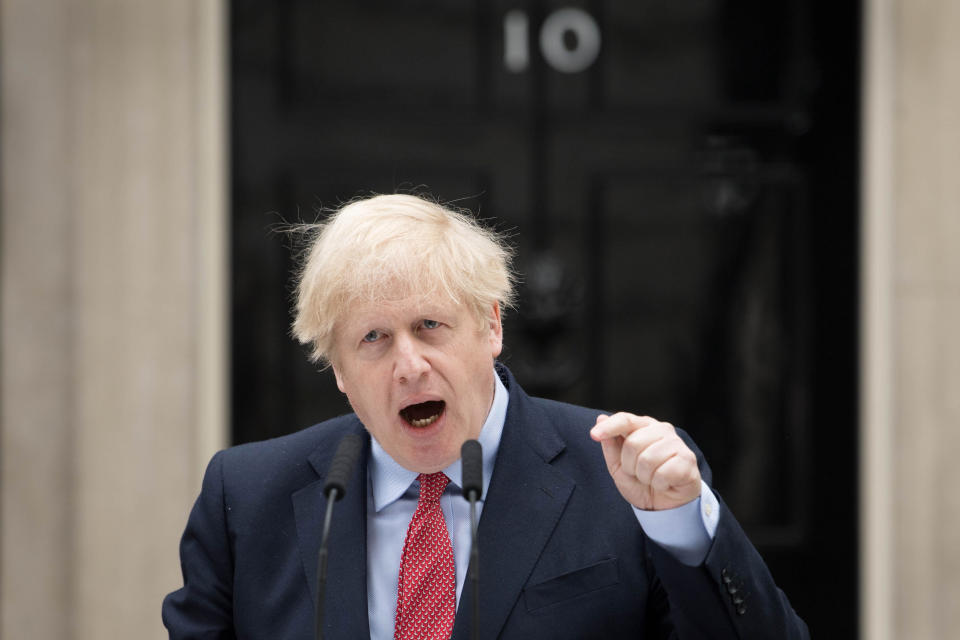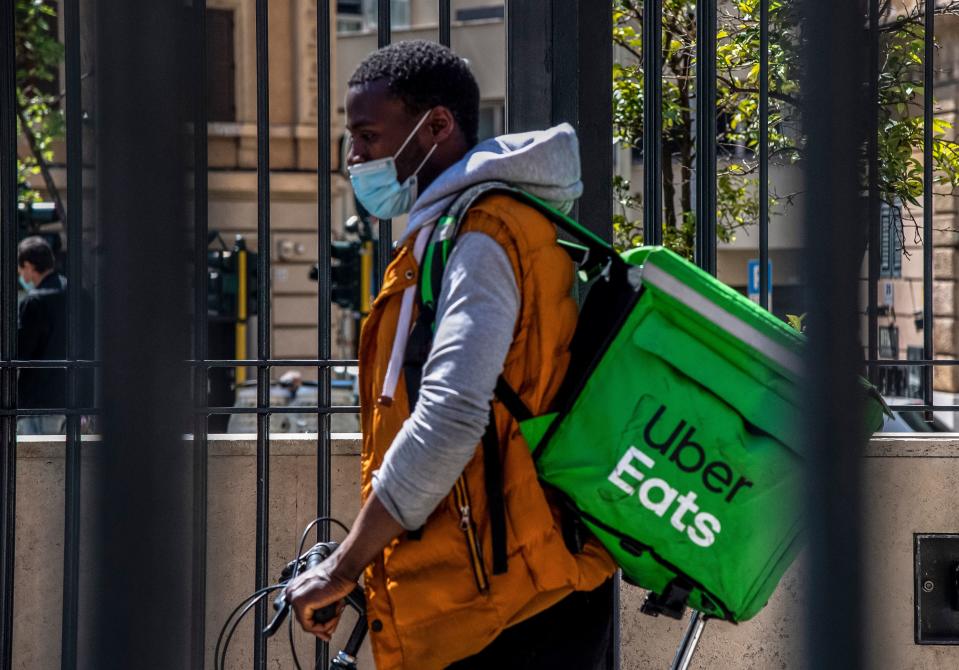'Nothing sinister is going on': Health officials defend Cummings attending secret advisory group for coronavirus

Health officials have defended Dominic Cummings’s attendance at the somewhat secretive scientific meetings that advise the government on the coronavirus outbreak.
Attendees of meetings held by the Scientific Advisory Group for Emergencies (Sage) are not made public, with minutes from the discussions typically being published once a crisis has passed.
The Guardian reported that Cummings – Boris Johnson’s chief adviser – and Tory adviser Ben Warner attended a meeting held the day the UK went into lockdown.
This sparked controversy, with the former Brexit secretary David Davis calling for “any non-scientist members” to be “removed” from future discussions.
The UK’s former chief scientific adviser (CSA) Professor Sir Mark Walport has reassured the public, however, “nothing sinister is going on”.
Current CSA Sir Patrick Vallance said government “officials have always been” at meetings since Sage was founded in 2008.

Calls for politicians to be banned from Sage meetings
Sage is a panel of medical and scientific experts chaired by Sir Patrick that provides independent advice to the government during a crisis.
Sir Patrick has explained how around 20 scientists attend each meeting, not necessarily the same individuals every time.
The make-up of the committee is secret, but members can choose to reveal themselves.
Latest coronavirus news, updates and advice
Live: Follow all the latest updates from the UK and around the world
Fact-checker: The number of COVID-19 cases in your local area
Explained: Symptoms, latest advice and how it compares to the flu
After The Guardian’s leaked report, Davis called for Cummings and Warner to be banned from future meetings.
“We should publish the membership of Sage, remove any non-scientist members, publish their advice in full and publish dissenting opinions with the advice,” he said.
Sage has been under increasing pressure to release its meetings’ attendees.
“Disclosing who has attended Sage meetings could reassure and enhance the standing of the body whose advice is so important to the country at this time,” said Greg Clark, the Tory chair of the Commons science committee, The Guardian reported.
“It would also allow for a better understanding of the range of disciplines which are shaping advice to government.”
Ed Davey, acting leader of the Liberal Democrats, added: “The public needs to have confidence that it is expert advice that is guiding government decisions.
“The lack of transparency is unacceptable in this national crisis.”
Downing Street has stressed it is “not true that Mr Cummings or Dr Warner are ‘on’ or members of Sage”.
A spokesman said the politicians had attended or listened in to meetings to better understand the scientific debate around the coronavirus.
He added they “occasionally” gave input when “scientists mention[ed] problems in Whitehall”.

Coronavirus: ‘Advice cannot be broadcast through a megaphone’
Speaking at a Science Media Centre briefing, Sir Patrick said how every Sage meeting is predominantly made up of scientists.
“Officials at Whitehall listen in and can ask questions, but they’re not part of the general discussion,” he said.
When asked about Sage meetings prior to the coronavirus, Sir Patrick said “officials have always been there”.
Sir Mark, who chaired discussions on Ebola and Zika, added “they were there during my time”.
“It’s important to have good transmission between advisers and the government, that’s why officials are there,” he said.
“It doesn’t work for scientific advisers to broadcast their advice through a megaphone.
“Nothing sinister is going on.”
Sir Patrick stressed advice from Sage has to be communicated to government officials before it is made public.
“You have to be able to give advice directly to ministers so they can make the decisions they need to make,” he said.
“[It would be] very difficult if everything we’re discussing is immediately public before someone has the chance to consider it and make the decisions.”
Summing up his stance, Sir Mark – current CEO of UK Research and Innovation – quoted Sir Winston Churchill.
“‘Scientists should be on tap, but not on top,’” he said.
“Politicians are on top.”

‘Outrageous’ if Cummings ‘took part in meetings’
Many other experts echoed Sir Patrick and Sir Mark’s reassurance.
“I was on a science advisory group for dementia research chaired jointly by Sally Davies and Mark Walport when David Cameron was prime minister,” said Professor Derek Hill from University College London.
“Advisors from No 10 often turned up, but just as observers.
“They spoke to us over coffee before it started, but never spoke during the meeting.
“It seemed entirely appropriate to ensure good communication given dementia was a government policy priority and minutes sometimes took a while to finalise.
“Likewise, No 10 observers at Sage meetings seems both reasonable and appropriate given the importance of the issues.”
Professor James Naismith from the University of Oxford added: “It would strike me as absolutely bizarre were non-scientists not listening in to these debates within Sage.
“Politicians have to weigh many factors in addition to scientific advice and I would be horrified if they were not taking steps to ensure they were exposed to the full breadth of scientific opinion.”
NHS England’s medical director Stephen Powis, a member of Sage, told BBC Radio 4's Today programme: “I have been confident what happens at Sage is a scientific discussion involving the scientists and the experts who are members of Sage.”
Some experts questioned, however, whether Cummings only observed the meeting.
Sage participants told The Guardian the Downing Street advisers actively took part in discussions about coronavirus-related advice.
“I can’t imagine Dominic Cummings’s attendance at Sage meetings as an observer would have affected the concentration of our scientists on the issues of how to get us out of a pandemic with as few lives lost,” said Professor Dame Til Wykes from King’s College London.
“If he was not just an observer and took part in those meetings, that is outrageous.
“We need impartial scientific advice as that boosts public confidence in all political decisions.
“That can never happen if there is a politician at the table asking questions.”
Dr Chris Tyler from University College London agreed this would be “concerning”.
“Political decisions should be informed by the science; the science should not be informed by the politics,” he said.
Dr Jennifer Cole from the University of London stressed it all depends on the sort of discussions Cummings may have been involved in.
“Sage is not a fixed group, but flexible and adaptable depending on the expertise needed for the particular issue at hand,” she said.
“Having a politician there to help explain how the evidence will be utilised, what decisions it will help to inform and also advise when an outcome scientists suggest may not be politically prudent or feasible can help to work through the best alternatives.
“It should not be taken that he is seeking to influence the scientists, but rather to help them understand exactly what information government needs and how that can be best communicated to the policymakers.”
Sir David King, former CSA, has also expressed concerns.
“What we don't know is the influence [Cummings] plays in taking what he interprets from those meetings back to the prime minister,” he said.
When asked about this at the Science Media Centre briefing, Sir Patrick said: “All I’m worried about is the prime minister hears scientific advice from me and that’s what happens.”

What is the coronavirus?
The new coronavirus is one of seven strains of a virus class that are known to infect humans.
Others cause everything from the common cold to severe acute respiratory syndrome (Sars), which killed 774 people during its 2002/3 outbreak.
Since the coronavirus outbreak was identified, more than 2.9 million cases have been confirmed worldwide, according to Johns Hopkins University.
Of these cases, over 881,600 are known to have “recovered”.
Globally, the death toll has exceeded 207,200.
The coronavirus mainly spreads face to face via infected droplets expelled in a cough or sneeze.
There is also evidence it may be transmitted in faeces and survive on surfaces.
Symptoms include fever, cough and slight breathlessness.
Early research suggests the infection is mild in four out of five cases, but it can trigger a respiratory disease called COVID-19.
The coronavirus has no “set” treatment, with most patients naturally fighting off the infection.
Those requiring hospitalisation are given “supportive care”, like ventilation, while their immune system gets to work.
Officials urge people to ward off the coronavirus by washing their hands regularly and maintaining social distancing.




